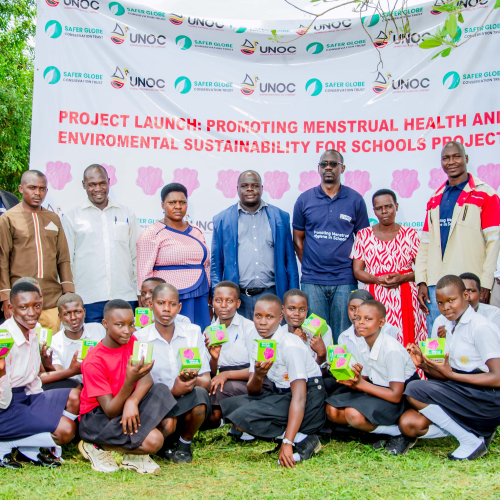Advancing Sustainable Agricultural Practices in A Conservative Approach
Promotion of Smart Agriculture
Smart agriculture has emerged as one of the most environmentally friendly and economically viable approaches to modern farming. It empowers farmers to leverage technology, optimize resource use, and increase productivity, making farming a more sustainable and profitable business venture. This is especially beneficial for farmers seeking to adopt farming as a livelihood or commercial enterprise. SGCT supports the integration of farm enterprises in a way that reduces production costs and minimizes reliance on harmful practices such as excessive use of chemical inputs like acaricides. We work with communities to transition from unsustainable methods such as conventional tobacco farming and heavy biomass.
Use toward more planned, eco-friendly agricultural systems. These include integrated tree and crop farming, traditional organic practices, and scientifically validated sustainable methods. We also promote farming as a social enterprise, with a focus on staple crops like maize and beans, which play a key role in ensuring food security across Uganda.

Climate Smart Agriculture (CSA)
Climate Smart Agriculture is an integrated approach to farming that conserves water, soil, and farmer resources while increasing resilience to climate change. It helps farmers improve productivity, profitability, and food security, while reducing vulnerability to climate related shocks. Our focus includes addressing the effects of climate change in the Lake Victoria Basin, where flooding and prolonged droughts have severely disrupted farming activities.
Our CSA Approach Involves:
- Reduced Tillage: Conventional tillage, especially using tractors, disturbs soil structure and releases large amounts of carbon dioxide, contributing to greenhouse gas emissions. We promote conservation practices like the use of hand hoes and spot pitting, which preserve soil nutrients and reduce emissions.
- Crop Rotation: We encourage farmers to rotate legumes with non-legumes to improve soil pH (ideally around 6) and maintain nitrogen levels. With Uganda’s two planting seasons, we sensitize farmers to avoid growing the same crop on the same land consecutively.
- Mulching: Mulching preserves soil moisture, prevents erosion, suppresses weeds, and protects soil structure ultimately lowering the carbon footprint by reducing the need for mechanical or chemical weed control.
- Reduced Herbicide Use: Over-reliance on herbicides harms essential soil microorganisms and pollinators like bees. We promote natural weed control techniques to protect soil health and biodiversity.
- Organic Fertilizers and Manure: These improve soil integrity and are safer for human and environmental health. Unlike artificial fertilizers, they do not require manufacturing, a sector responsible for about 37% of global emissions. Organic methods are also more accessible to vulnerable farming groups.
- Drip Irrigation: This method conserves water and energy by using gravity to deliver water directly to plant roots, improving efficiency and reducing emissions.
- Water Quality Protection: Protecting both natural water bodies and domestic sources is key. Avoiding pollution ensures ecosystems (e.g., algae) continue to purify water naturally.
- Riverbank Protection: Rivers across Uganda are suffering due to sand mining, clay extraction, and unregulated farming, leading to flooding and ecological degradation. We advocate for the protection and restoration of riverbanks to reduce climate vulnerabilities.
- Solar Irrigation: Powered entirely by renewable energy, solar irrigation supports offseason farming and higher returns during peak market prices. It’s a clean, efficient way to ensure water availability.
- Disease-Resistant Varieties: These reduce the need for chemical pesticides and increase the chances of better yields with lower environmental impact.
- High-Yielding and Fast-Maturing Crops: These reduce labor and input needs while maximizing output, lowering overall carbon footprints.
- Timely Planting: We work with the Uganda Meteorological Authority to provide farmers with accurate weather updates, helping them avoid invasive species and climate-related crop failures.
- Promotion of Indigenous Varieties: Local crops such as maize and beans are better adapted to the region and more resistant to local pests and diseases.
- Improved Breeds: High-performing animal breeds require fewer resources and provide better yields in terms of meat, milk, or labor, thus enhancing farmer profitability.
- Disease Resistance: Breeds that resist local diseases reduce the need for frequent medication, saving money and reducing environmental contamination.
Other SGCT Thematic Areas

Promoting Biodiversity Conservation
Our approach includes identifying vulnerable households and providing them with access to renewable energy technologies

Promoting Environmental Education and Awareness
We prioritize environmental conservation efforts within the most vulnerable and at-risk communities.

Strengthening Institutions, Partnerships, and Collaborative Networks
To facilitate joint monitoring of environmental activities, the development of advocacy position papers.
Why Work with The Organization for Safer Globe Conservation Trust?
GROUNDED IN COMMUNITY-CENTERED ENVIRONMENTAL SOLUTIONS:
SGCT partners directly with vulnerable and at-risk communities to promote sustainable, science based environmental practices. From clean energy access to reforestation and sustainable agriculture, their grassroots approach ensures long-term impact.
PROVEN IMPACT ACROSS MULTIPLE SECTORS:
The Trust actively delivers results in biodiversity conservation, renewable energy adoption, climate smart agriculture, environmental education, and girls health. Their diverse, integrated programs are already transforming lives across districts in Uganda.
STRONG PARTNERSHIPS AND INSTITUTIONAL NETWORKS:
SGCT works with government agencies, civil society coalitions, schools, and international partners like the Uganda National Oil Company (UNOC). These collaborations amplify their reach, accountability, and policy influence essential for sustainable development.
